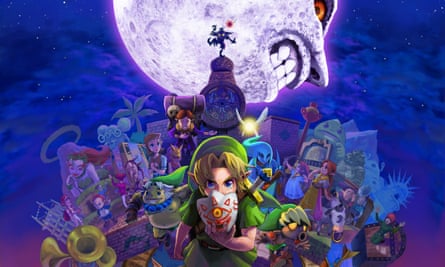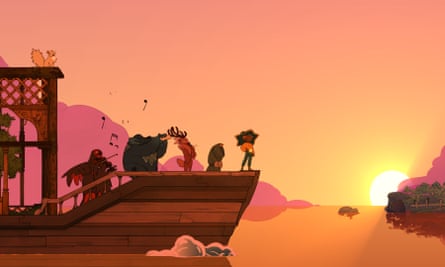— How video games help people through grief

Players have long found a refuge from grief in video games – and a recent wave of games is tackling this difficult theme head-on
By Emma Flint
When James’s father died, he did what any of us would do in the throes of grief: he sought comfort. He went looking for it in the expected places – friends, family – but he found it somewhere unexpected: in the video game The Legend of Zelda: Majora’s Mask.
“Dad had always loved games. He gave me his NES when he got the SNES, and my formative memories were playing Mario Kart 64 with him, my uncle, and my little sister. Shortly after my father passed, the Wii added some N64 games to its catalogue that I had loved to play growing up, and that started the journey I needed to take to forgive him,” says James. “I had felt abandoned by him – when I was right at the shifting point of puberty, about to learn how to drive, he just wasn’t there.
“Majora’s Mask was always one of my favourites; I had the strategy guide and would read it to my dad in the truck when I would go with him to work during the summer. When I revisited it, I distinctly remember crying when I walked through the tunnel to the clock tower after the intro, knowing it was the first time I’d done it without him … People have theorised that Majora’s Mask symbolises the five stages of grief, and when I started to look at the game this way, it eventually helped me to visit his grave alone for the first time since his funeral, about a year after his death.”

James is one of many people who’ve found a route through grief in video games. It’s often assumed that we long for avoidance when we venture into imaginary worlds – and they can indeed offer vital escapism when the real world is difficult. But the nature of video games demands active participation, which can help players to process their feelings, free from real-world expectations about correct ways to grieve.
“What I’ve come to realise recently is how closely intertwined video games and nostalgia are,” says Stephen Sexton, author of the poetry collection If All the World and Love Were Young. “If you’ve spent a lot of time with a video game, its spaces and places become familiar to you, encoded in your memory. For me, the idea of forgetting the experience of grief was frightening. So, I found myself pinning my grief narrative – my mother’s illness and death – to something familiar: the levels and environments of Super Mario World. It’s become a kind of mnemonic device for me … the video game world became the bewildering world of grief; bright, overwhelming, symbolic.”
In recent years, several games have been made about the experience of grief itself, such as Gris, Spiritfarer, and Lost Words: Beyond the Page. In each of these examples, the labyrinthine complexities of grief are explored through a protective lens, letting us care for and guide grieving characters, enabling close proximity to our emotions while simultaneously shielding us from them.
Sometimes the guidance is subtle, delicately interwoven in a larger overarching story, as with Lost Words. But in games like Spiritfarer and Gris, we take an active hand in proceedings. These are potent narratives about death and the human experience that let us freely choose how to engage with them. “Loss is an intimate, personal experience,” Nicolas Guérin, Spiritfarer‘s creative director, explains. “And video games allow users to have an active, interactive introspection window, at their own pace.”

In Spiritfarer – a game about housing troubled spirits on an ever-expanding houseboat, until they work through their unfinished business and pass on to the next realm – you (initially) can’t remove the houses of spirits who’ve crossed over. The limited space on your boat is taken up by seemingly redundant buildings, and we cannot ignore them. “Many players (and even people on the team) didn’t understand why they couldn’t remove these houses from the ship,” says Guérin.
“As an answer, I would remember a specific time in my life, which was when I was a young teenager, and my mother’s cousin had died. She was a lonely person, and kind of a hoarder. Her house was choked full of things, and my mother had to sift through them. Souvenirs from travels, tchotchkes from unusual hobbies, family mementoes. These objects form a trace of you; haphazardly assembled physical heritage, both dramatic and absurd, of the life you’ve had. Having to keep the departed spirits’ homes was exactly that … their home represented the burden of memories.”
Like novels and films, games can also offer hope, a route out of an emotional state that might feel inescapable. “Lost Words: Beyond the Page provides an example of how someone can get through this (which can be hard to see when you are in the middle of grief), and the strategies that other people use to manage and process their loss,” says Caitlin Hitchcock, a clinical psychologist and researcher at the University of Melbourne, who also acted as a consultant on the game. “Much of this is subtle – narrative is just one aspect of a video game. People who might be hesitant to watch a film about a young woman processing grief, might be more likely to play a video game. The game takes a hard topic, which many of us avoid, and presents it in a more palatable context.”

Games have the power to normalise grief and offer comfort and, as all art does, they can help us find meaning in our trauma so that we can overcome it. “Avoiding thinking and talking about the loss can maintain poor psychological wellbeing,” explains Hitchcock. “Playing a game about someone else’s grief is going to trigger thinking about your own grief, due to the way that associations between information are formed in the brain. A game can therefore reduce avoidance of your own grief, but potentially in a way that is less confronting or painful.”
Games about grief don’t necessarily intend to educate. Instead, they offer a sense of belonging to a universal experience; they can normalise death. “We never meant to impose a grand meaning or give a lesson with Spiritfarer. We just tried to open up a space for players to feel at ease around people who were about to die, to view death as a simple, undramatic part of life,” Guérin explains. “To simply enjoy the little things and the small talk, to sometimes face the burden and the grim fate of passing away, but more importantly to feel our connections, the mutual influences that are shaping us.”
Complete Article ↪HERE↩!
